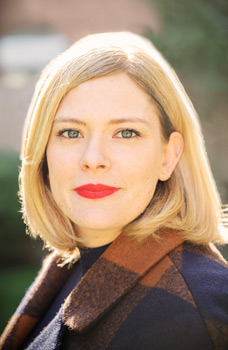
How to pronounce Susannah Cahalan: Cuh-HAY-lan
Susannah Cahalan discusses her latest book, The Great Pretender, and what she hopes people will learn from reading it.
What drew you to this topic? Did you go looking for such an explosive story, or was it luck?
It started from a highly personal place. When I first read David Rosenhan's study, his experience with depersonalization and labeling rang so true to my own experience. But chancing upon that explosive story (as you describe it!) was total luck. When I was writing the book, I didn't see these issues as a positive thing for the narrative—I worried that this book was done with!
Why do you feel it is important or urgent for readers to be discussing Rosenhan and his work?
Even though Rosenhan's study is now almost fifty years old, so many of the questions that he raises in it—how to distinguish "sanity" from "insanity," how to treat serious mental illness, the role of context in diagnosis—have remained with us. Rosenhan's study crystalizes the importance of asking these questions and the importance of being honest and open about the limitations in answering them.
What was your favorite part of researching the book? Of writing it? What was the biggest surprise?
I had such a joyous time writing this book—mostly because of the extraordinary people I met—among them David's close friend and confidant Florence Keller and his son,Jack Rosenhan, both of whom are now close friends. I loved mining Rosenhan's personal files and getting access to his mind. I loved learning about the history and digging through archives. And I loved discussing these impossible topics with some great thinkers. The whole experience, as difficult and dark at times as it was, was such a gift
You were a journalist before you were a bestselling memoirist. In what ways do you think Brain on Fire influenced your writing of The Great Pretender? Would this be a different book if you were just coming in as a pure outsider, a journalist curious about the mysteries Rosenhan left behind?
Brain on Fire touched every page of this book. The Great Pretender is not only informed by my experience with misdiagnosis; it's also a reaction to the reader responses and my own shifting views on what happened to me. Without the experiences chronicled in my memoir, I would not have been able to write the book as it stands. Even though most of the book is not about me, my interests, my fears, my obsessions are all over the narrative.
What do you want readers to take away from the book?
I hope that this book raises questions that you may feel more comfortable discussing, even if you don't (and you won't) have all the answers. I hope that it provides an education and that it gives some insight into the terrible ways we've dealt with these issues in the past. I hope that the book both makes you more skeptical about modern medicine and mental healthcare but also more optimistic. I hope that people who live with serious mental illness or people who have family members or friends who do, walk away with a deeper understanding of our shared history — a history we need to fully understand if we expect to move forward.
What three books would you recommend to readers interested in learning more?
This is a tough one! There were so many books that informed my thinking (check out the notes for a full list). I particularly love Ron Powers's No One Cares About Crazy People which is rallying cry in the form of a deeply moving memoir. I found Andrew Scull's Madness in Civilization indispensable. And although I wasn't lucky enough to read this miraculous book when I wrote The Great Pretender I highly recommend Esme Wang's The Collected Schizophrenias to anyone interested in hearing a gorgeous writer discuss what it's like to live with a serious mental illness.
Unless otherwise stated, this interview was conducted at the time the book was first published, and is reproduced with permission of the publisher. This interview may not be reproduced or reprinted without permission in writing from the copyright holder.
Your guide toexceptional books
BookBrowse seeks out and recommends the best in contemporary fiction and nonfiction—books that not only engage and entertain but also deepen our understanding of ourselves and the world around us.